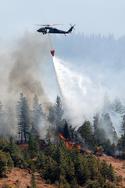Someone in Bend must be reading this blog, or at least thinking along the same lines. In 2017, after the Wine Country fires had burned homes in Santa Rose, the Antiplanner noted that the problem was the homes were too dense and needed a buffer of low-density homes around them. I made the same point after the Camp Fire burned homes in Paradise.
Now Deschutes County is zoning a buffer between Bend and the national forest for low-density housing. read more »






















